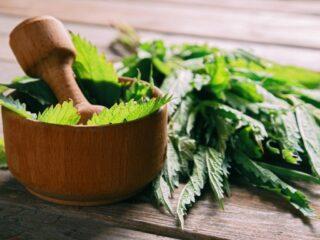Content
In official and traditional medicine, treatment of joints with nettle in combination with traditional methods and physiotherapy is considered effective. It is necessary to prepare dosage forms from the plant and apply them in practice strictly according to the prescription and after consulting a doctor.
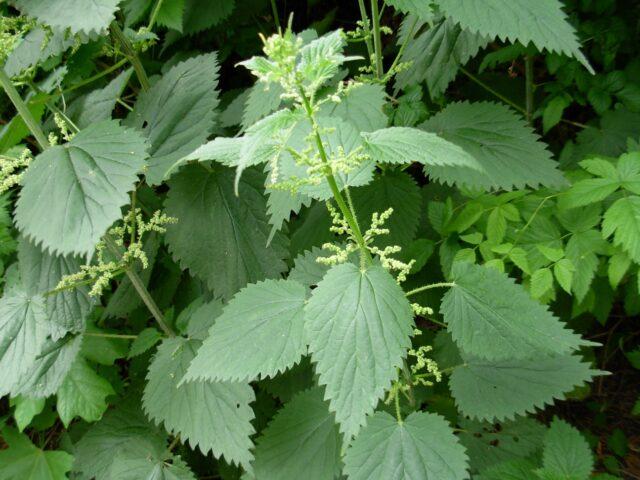
Raw materials are harvested from May to mid-July
Why nettle is good for joints
There are about fifty thousand species of burning plants in the world. They differ in appearance, but the chemical composition and useful properties are identical.
In Russia, for medicinal purposes, stinging nettle is most often used, the most common type. Its healing properties are explained by its chemical composition, which includes:
- vitamin C;
- carotene;
- chlorophyll;
- flavonoids;
- carotenoids;
- vitamin K;
- organic acids;
- macronutrients (potassium, iron, magnesium, zinc, etc.).
The composition allows you to have a therapeutic effect on the joints:
- Stop inflammatory processes.
- Relieve pain.
- Reduce puffiness.
- Improve immunity.
- Stimulate blood circulation.
- Suppress infection.
- Enhance tissue regeneration.
- Improve the elasticity of blood vessel walls.
How to use nettle to treat joints
The medicinal properties of the plant make it possible to alleviate the patient's condition with joint pathologies. Dosage forms based on it are used depending on the indications and symptoms. For this purpose, infusions, decoctions, tinctures, ointments and teas are prepared.
Decoction of leaves
May nettle is believed to be the most effective in treating joints. To prepare a decoction according to the classic recipe, you need the following ingredients:
- fresh nettle leaves - 50 g;
- water - 2 l.
Cooking procedure:
- The foliage is crushed.
- Placed in an enamel bowl.
- Pour in water.
- Bring to a boil and simmer over low heat for 10 minutes.
- Cool, filter.
Take 100 ml three times a day before meals.
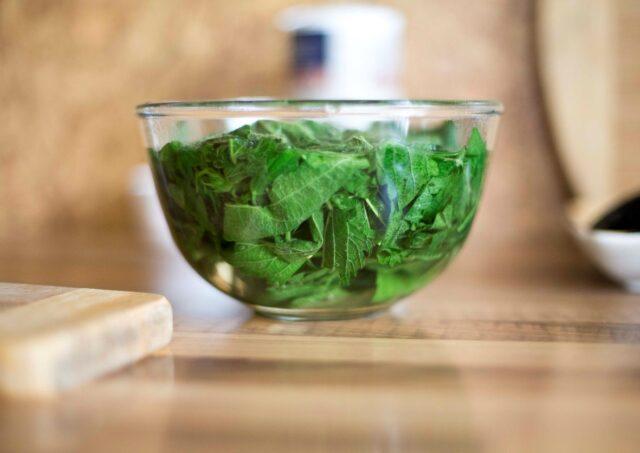
It is convenient to cook the broth in a water bath
Infusion of leaves
Drinking the infusion helps to relieve rheumatic joint pain.
The composition includes:
- nettle foliage - 30 g;
- wild rosemary - 50 g;
- boiling water - 1 liter.
Cooking procedure:
- Vegetable raw materials are crushed and mixed.
- Pour boiling water over.
- Insist 15 minutes.
- They are filtering.
Take 50 ml five times a day.
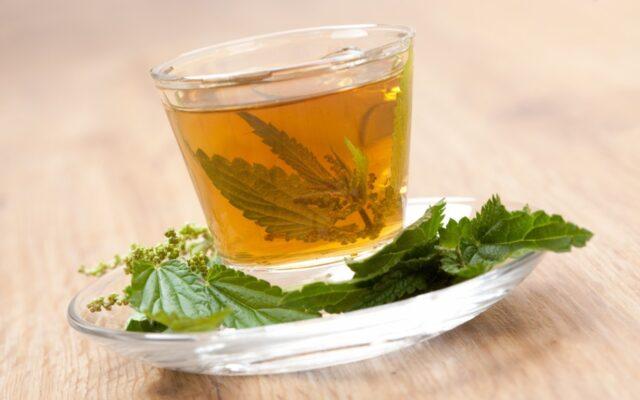
The infusion may include other medicinal herbs - sweet clover, string, asparagus
Tincture
To get rid of joint pain, a tincture is often used, which includes:
- nettle roots and leaves - 100 g;
- medical alcohol - 500 ml.
Cooking procedure:
- The raw material is thoroughly crushed and placed in a dark glass container.
- Pour in alcohol.
- Cork tightly.
- Store for thirty days in a dark place, shaking occasionally.
- They are filtering.
The tincture can be taken internally or externally. In the first case, 15 ml of the product is diluted in 100 ml of water and taken twice a day for a course of two weeks.
Sore joints are rubbed outwardly with tincture five times a day. The duration of treatment is one month.
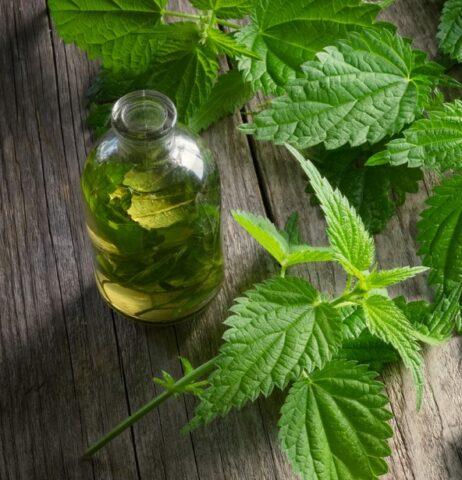
Instead of alcohol, vodka is acceptable
Herbal tea
For joint diseases, it is useful to take herbal tea. It includes:
- dry nettle leaves - 3 tbsp. l .;
- boiling water - 1 liter.
The way to prepare it is very simple:
- Nettle is poured with boiling water.
- Insist for a quarter of an hour.
During the day, take no more than four cups of the medicinal drink.
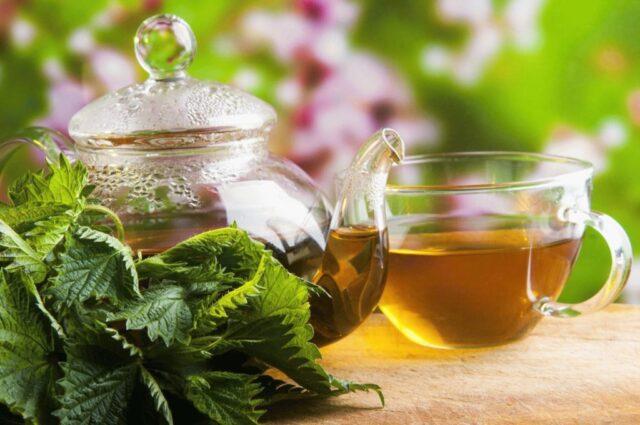
Dried rose hips are often added to herbal tea.
Nettle oil
An effective remedy for joint pain is oil made from the leaves, seeds, or roots of nettle. It requires ingredients:
- raw nettle;
- refined vegetable oil.
Cooking procedure:
- Pass the leaves and stems of the plant through a meat grinder.
- Place the mass without tamping into a glass jar, filling it to two-thirds of its volume.
- Fill with oil to the brim.
- Close the lid and place in a cool, dark place for two weeks.
- Stir occasionally.
- Filter.
The product is used as a rubbing agent once a day.
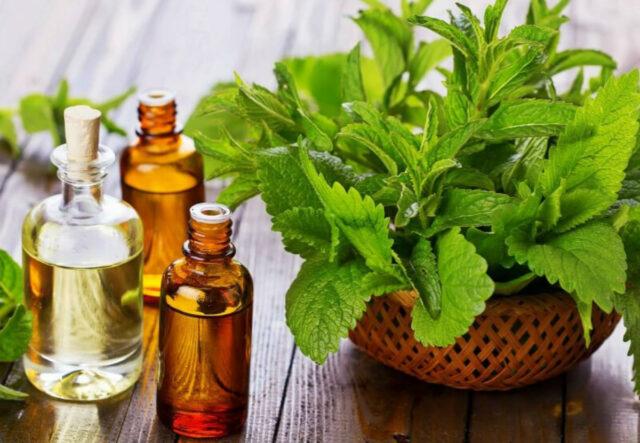
The oil is ready when the nettle particles become clear and the liquid darkens
Ointment and compresses
The ointment can also be made at home. For her you need ingredients:
- fresh nettle leaves - 50 g;
- butter - 100 g.
Cooking procedure:
- Soften butter at room temperature.
- Grind the leaves with a blender.
- Mix them with butter.
- Insist for three hours.
- Stir again.
Use the ointment at bedtime. Rub into the joint with massage movements, after which a warm bandage is applied. The course is two weeks.
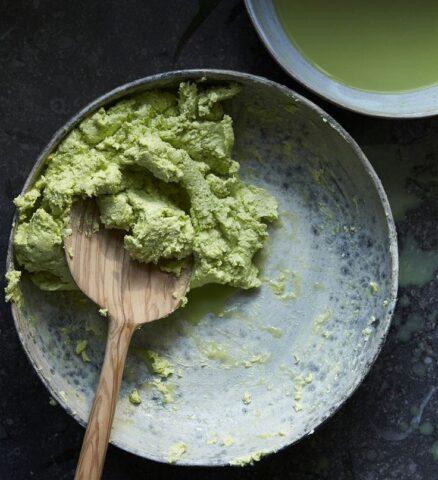
You need to store the ointment in the refrigerator.
For aching pain in the joints, you can apply a compress, for which you will need:
- fresh leaves of nettle and burdock;
- bandage.
Blending order:
- Nettle is twisted in a meat grinder.
- Apply gruel to the sore spot.
- Cover with a leaf of burdock.
- Fix with a bandage.
The compress is applied to the sore joint once a day for 30 minutes. The course is ten days.
Healing baths
For nettle baths, a decoction is first prepared, for which they use:
- nettle roots - 100 g;
- fresh leaves - 250 g;
- water - 1 l.
Cooking procedure:
- The mixture is poured over with water.
- Boil for 30 minutes.
- Insist 1 tsp.
- They are filtering.
The broth is poured into a bath of warm water and taken for 20 minutes.

To enhance the action, add horseradish, needles and birch leaves
Nettle brooms in the bath
It is very useful for sore joints to steam in the bath with nettle brooms, it is harvested before flowering. The stem should be strong and the foliage should be lush. The broom is steamed not in boiling water, but in warm water.
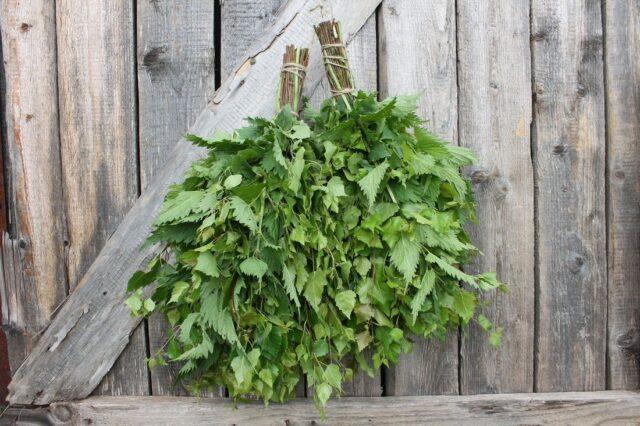
Before the procedure, you need to steam well and warm up the body.
Fresh stinging nettle for pain relief
Fresh nettle is used as an ambulance for sore joints. It is torn off, withers a little in the sun to lose its strong pungency, and is applied to the sore spot.
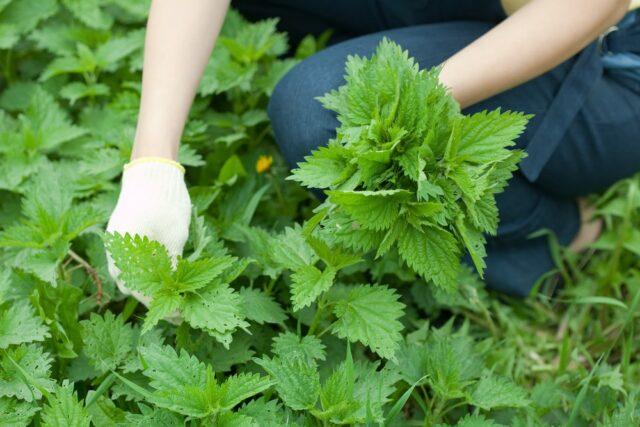
In folk medicine, to get rid of spasms, the joints are lashed with nettles covered with morning dew.
The use of nettle for joint diseases
Home treatment of nettle leg joints can relieve pain from arthritis, arthrosis, bursitis, rheumatism and gout. The correct use of herbal dosage forms in combination with traditional treatments helps to stop the progression of the disease and prevent complications.
With osteochondrosis
To relieve spasms, blood flow to the muscles and reduce pain in osteochondrosis, nettle oil is used. Applying to the skin and rubbing in the product helps to restore cartilage tissue. For this, the procedure is carried out four to five times a day for two weeks.
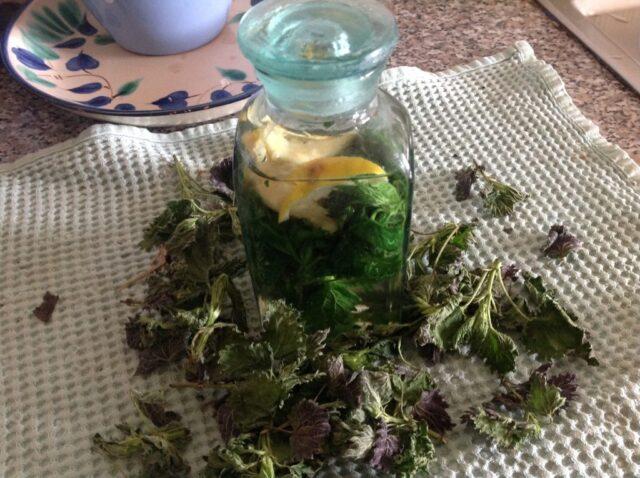
Do not use nettle for people at risk of heart attack.
With rheumatism
Joint pain caused by rheumatism is treated with decoctions and infusions. They are taken during an exacerbation of the disease, 200 ml every 2 hours until the symptoms subside.
With arthritis and polyarthritis
When joints are affected by arthritis or polyarthritis, official medicine offers methods to strengthen the immune system and act locally on the site of pain. With a severe course of the disease, surgical intervention is possible.
For complex therapeutic treatment, baths and ingestion of decoctions and infusions are used, which, in addition to nettle, may include mint, linden flowers and dill seeds.
With gout
The cause of the disease is a violation of metabolic processes. As a result, uric acid and urate crystals accumulate in the joints. Nettle helps to mitigate the course of the disease in its chronic stage. For this, all parts of the plant are used, from which a decoction, infusion or alcohol extract is prepared. They help relieve swelling and reduce inflammation. The compress and the use of the plant fresh in salads and first courses have a positive effect.
With a heel spur
In folk medicine, the method of treating heel spurs with the help of a compress is very popular. Fresh chopped nettle is applied to the heel with a layer of 1 cm, and on top - a burdock leaf (velvety side inward). Cover with cling film and secure with a bandage overnight. May nettle gives the greatest effect if you apply the method within a month.
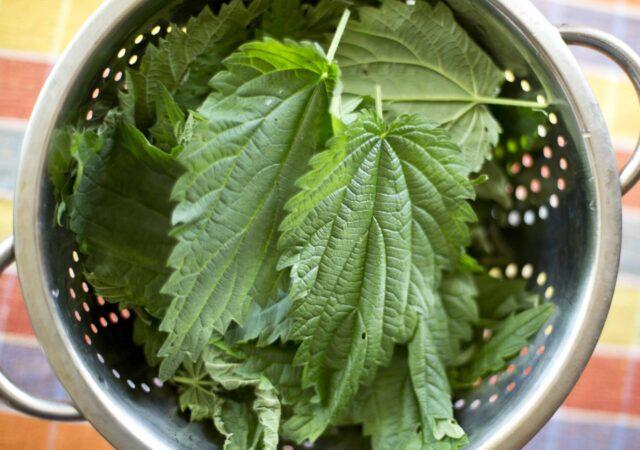
Two-week breaks are taken between courses of treatment.
With arthrosis
Arthrosis of the knee joint occurs in a huge part of the population, including very young people. In treatment, a decoction, which is taken 200 ml twice a day, has proven itself well.
Nettle vodka tincture is taken orally, 20 ml twice a day, or rubbed with it on the affected joint.
For pain in the joints and spine
Herniated discs often cause unbearable pain. To alleviate the condition, along with the main treatment, nettle is used. At an early stage of the disease, it is used in the form of applying compresses from fresh leaves, rubbing with tincture on alcohol, taking medicinal baths with infusion on the plant, herbal tea.
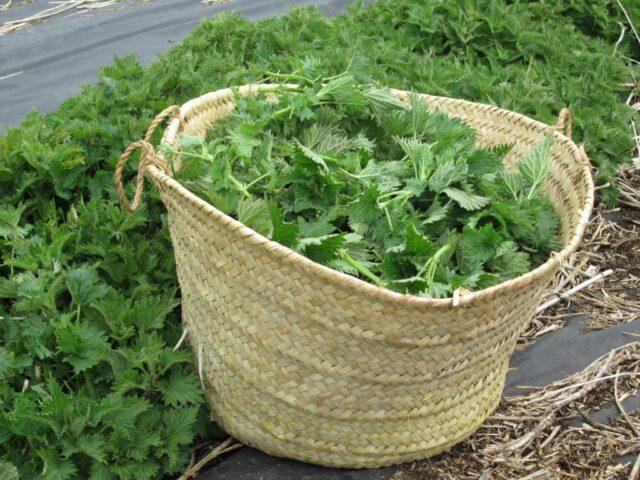
Raw materials can be bought at a pharmacy or prepared by yourself
Features of the use of nettle in the treatment of joints
Nettle should be used with caution for treatment. First you need to find out the exact diagnosis and get a doctor's recommendation. You can not replace the scheme prescribed by the doctor with folk methods. If they can be combined with the main treatment, the dosage of the dosage forms is strictly observed when taken orally. It is worth remembering that taking baths is contraindicated in patients with hypertension, as it can cause a crisis. Ointment, oil, compresses must be tested for an allergic reaction.
Contraindications
Along with the positive effects of nettle, its use can cause an undesirable reaction, therefore there are restrictions and contraindications to the use of herbal medicines. Among them:
- atherosclerosis;
- thrombophlebitis;
- phlebeurysm;
- internal bleeding;
- heart failure;
- increased blood clotting;
- pregnancy in the first trimester;
- childhood;
- renal failure;
- individual intolerance.
Conclusion
Treatment of joints with nettle is a simple, affordable and effective method. Using it as an additional method to the main one, you can significantly reduce pain and improve the quality of life at any age.








